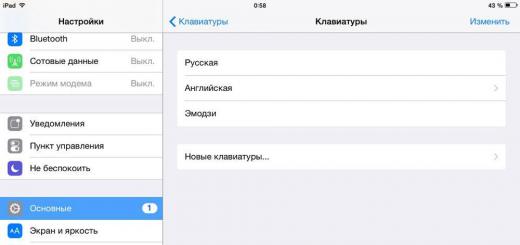Surely many have heard about the international system of levels of the English language, but not everyone knows what it means and how to classify it. The need to know your level of English proficiency may arise in some life situations. For example, if you need to pass an interview at work or at the embassy, if you need to pass some international exam (IELTS, TOEFL, FCE, CPE, BEC, etc.), when entering a foreign educational institution, when getting a job in another country, and also for personal use.
The international system for determining knowledge of the English language can be divided into 7 levels:
1. Beginner - Initial (zero). At this level, the student knows almost nothing in English and begins to study the subject from scratch, including the alphabet, basic reading rules, on-duty greeting phrases and other tasks of this stage. By the end of the Beginner level, students can usually answer questions easily when meeting new people. For example: What is your name? How old are you? Do you have brothers and sisters? Where are you from and where do you live? etc. And they can also count up to a hundred, spell their name and personal data. The latter in English is called spelling.
2. Elementary - Elementary. This level follows immediately after zero and implies knowledge of some basics of the English language. The Elementary level gives students the opportunity to use previously learned phrases in a more free form, and also instills a whole range of new knowledge. At this stage, students learn to briefly talk about themselves, their favorite colors, dishes and seasons, weather and time, daily routine, countries and customs, etc. In terms of grammar, at this level there is an initial acquaintance with the following tenses: Present Simple, Present Continuous, Past Simple, Future Simple (will, to be going to) and Present Perfect. And also some modal verbs (can, must), different types of pronouns, adjectives and their degrees of comparison, categories of nouns, forms of simple questions are considered. Having firmly mastered the Elementary level, you can already take part in the KET (Key English test) testing.
3. Pre-Intermediate - Below Intermediate. The level following the Elementary is called Pre-Intermediate, literally translated as Pre-Intermediate. Having reached this level, students already have an idea of how many sentences and phrases are built, they can speak briefly on many topics. The Pre-Intermediate level adds confidence and expands the learning potential. There are longer texts, more practice exercises, new grammatical topics, and more complex sentence structures. Topics encountered at this level may include complex questions, the Past Continuous, different forms of the future tense, conditional sentences, modal verbs, infinitives and gerunds, repetition and reinforcement of the Past Simple tenses (regular and irregular verbs) and Present Perfect, and some others. In terms of oral skills, after passing the Pre-Intermediate level, you can safely go on a journey and look for any opportunity to use your knowledge in practice. Also, a solid knowledge of English at the Pre-Intermediate level makes it possible to participate in the PET (Preliminary English Test) test and the BEC (Business English Certificate) Preliminary exam.
4. intermediate. At the Intermediate level, the knowledge gained at the previous stage is consolidated, and a lot of new vocabulary is added, including complex ones. For example, personal characteristics of people, scientific terms, professional vocabulary and even slang. The object of study is active and passive voices, direct and indirect speech, participial and participle phrases, phrasal verbs and prepositions, word order in complex sentences, varieties of articles, etc. Of the grammatical tenses, the difference between Present Simple and Present Continuous, Past Simple and Present Perfect, Past Simple and Past Continuous, as well as between various forms of expression of the future tense, is considered in more detail. Texts at the Intermediate level become longer and more meaningful, and communication becomes easier and freer. The advantage of this stage is that in many modern companies, employees with knowledge of the Intermediate level are highly valued. Also, this level is ideal for avid travelers, as it allows you to freely understand the interlocutor and express yourself in response. From international exams, after successfully passing the middle level, you can take the following exams and tests: FCE (First Certificate in English) for B / C, PET Level 3, BULATS (Business Language Testing Service), BEC Vantage, TOEIC (Test of English) for International Communication), IELTS (International English Language Testing System) by 4.5-5.5 points and TOEFL (Test of English as a Foreign Language) by 80-85 points.
5. Upper Intermediate - Above average. If students progress to this level, it means that they can understand fluent English fluently and communicate easily using the vocabulary that they have already acquired. At the Upper-Intermediate level, it becomes possible to use English much more in practice, since there is a little less theory, and if there is, it basically repeats and reinforces the Intermediate level. Of the innovations, Narrative Tenses (Narrative tenses) can be noted, which includes such difficult times as Past Continuous, Past Perfect and Past Perfect Continuous. It also covers the Future Continuous and Future Perfect, the use of articles, modal conjectural verbs, indirect speech verbs, hypothetical sentences, abstract nouns, causal voice, and more. The Upper-Intermediate level is one of the most popular in both business and education. People who are fluent in English at this level can easily pass any interviews and even enter foreign universities. At the end of the Upper-Intermediate course, you can take exams such as FCE for A / B, BEC (Business English Certificate) Vantage or Higher, TOEFL for 100 points and IELTS for 5.5-6.5 points.
6. Advanced 1 - Advanced. The Advanced 1 level is required for professionals and students who want to achieve high fluency in English. Unlike the Upper-Intermediate level, a lot of interesting turns appear here, including idioms. Knowledge of tenses and other grammatical aspects studied earlier is only deepened and considered from other unexpected angles. Discussion topics become more specific and professional, for example: the environment and natural disasters, legal processes, genres of literature, computer terms, etc. After the Advanced level, you can take a special academic exam CAE (Cambridge Advanced English), as well as IELTS for 7 and TOEFL for 110 points, and you can apply for a prestigious job in foreign companies or a place in Western universities.
7. Advanced 2 - Super advanced (native speaker level). The name speaks for itself. We can say that there is nothing more than Advanced 2, because this is the level of a native speaker, i.e. a person born and raised in an English-speaking environment. With this level, you can pass any interviews, including highly specialized ones, and pass any exams. In particular, the highest test of English proficiency is the CPE (Cambridge Proficiency Exam) academic exam, and as for the IELTS test, it can be passed to the highest score of 8.5-9 with this level.
This gradation is called ESL (English as a Second Language) or EFL (English as a Foreign Language) level classification and is used by ALTE (Association of Language Testers in Europe). The level system may vary, move around depending on the country, school or organization. For example, some organizations reduce the presented 7 levels to 5 and call them a little differently: Beginner (Elementary), Lower Intermediate, Upper Intermediate, Lower Advanced, Upper Advanced. However, the meaning and content of the levels does not change from this.
Another similar system of international exams under the abbreviation CEFR (Common European Framework of Reference for Languages) divides the levels into 6 and has other names:
1. A1 (Breakthrough)=Beginner
2. A2 (Waystage)=Pre-Intermediate - Below Intermediate
3. B1 (Threshold)=Intermediate
4. B2 (Vantage)=Upper-Intermediate
5. C1 (Proficiency)=Advanced 1 - Advanced
6. C2 (Mastery)=Advanced 2 - Super Advanced
Knowledge of English will vary from person to person. So, native speakers are fluent in it, foreigners who study the language for a sufficient amount of time can freely explain themselves in it on everyday topics, and those who have just started learning or have been learning English for a very long time know the language at an elementary level. Understanding at what level a person speaks a language is not so easy. For this, there are numerous tests on the Internet, they really help to determine language proficiency. But they check mainly the vocabulary and grammar of the student, but knowledge of the language is not only vocabulary and the ability to understand the rules. Therefore, in a foreign language course, you will be offered not only a written test, but also a little talk with each potential student in a foreign language, they will ask him various questions and invite him to speak. Only after the student has shown his knowledge in oral and written speech, in grammar and vocabulary, it is possible to declare his level of language proficiency.
What levels of language proficiency are there?
Intermediate is an intermediate level of English proficiency. There are 6 or 7 such levels in total, depending on different approaches to determining the level of language competence: Beginner, Elementary, Pre-Intermediate, Intermediate, Upper-Intermediate, Advanced, Proficiency. Sometimes in foreign language courses, some of these levels are divided into sublevels in order to more accurately determine which group to enroll the student in.
What do you need to know at the Intermediate level?
At the Intermediate level, it is expected that he knows the basic tenses of the English language well, knows how to use them in writing and speaking. The volume of his vocabulary is about 3-5 thousand words, which allows the student to speak quite well on everyday topics, understand English speech, and compose written texts of normal complexity. At the same time, such a student may make mistakes in speech, speak not too fluently, stutter a little, or choose words for a long time. He understands quite complex texts well - stories, novels written in literary language, popular science articles, he can read the news, but does not always perceive them well by ear. A person with an Intermediate level is unlikely to be able to correctly maintain a conversation on specific and complex topics; he does not speak business vocabulary if he has not been specially trained in words and expressions with a certain specificity.
In general, the Intermediate level is a fairly good level of knowledge of the English language. It can also include those who are not fluent enough in oral speech, but read books well in English, and those who speak well, but are not very well versed in the written features of the language. This level is sufficient for employment with the requirement of compulsory knowledge of the English language. This level of proficiency is shown by good graduates of ordinary schools or students of grades 8-9 of specialized schools and gymnasiums with in-depth study of the English language.
Individual entrepreneur Gulyaev V.V. this public offer invites any individual (hereinafter referred to as the CUSTOMER) to conclude an Offer Agreement for the provision of services for holding events (hereinafter referred to as the Agreement).
In accordance with paragraph 2 of Article 437 of the Civil Code of the Russian Federation (CC RF), if the conditions set out below and payment for services are accepted, the person accepting this offer becomes the CUSTOMER conditions set out in the offer).
In connection with the foregoing, carefully read the text of this public offer and, if you do not agree with any clause of the offer, the CONTRACTOR offers you to refuse to use the services or conclude a personal contract on separately discussed terms.
Full and unconditional acceptance of this public offer is the implementation by the CUSTOMER of payment for the Services offered by the CONTRACTOR.
1. GENERAL PROVISIONS
1.1. The subject of this Agreement is the provision by the CONTRACTOR of services for holding events (courses, classes, trainings, intensives, seminars, webinars, conferences, etc.) - hereinafter referred to as the Event for the CUSTOMER, subject to availability and/or the CUSTOMER's compliance with the CONTRACTOR's requirements for receiving the service . The CUSTOMER can read a detailed description of the Event itself on the necessary pages of the CONTRACTOR's website.
1.2. Under this Agreement, the CONTRACTOR provides the following services:
Preparation of the program of the Event;
Development of a calendar plan for the Event;
Holding the Event;
Full organizational support of the Event.
1.3. Conditions, term (date), duration and place of the Event are indicated on the pages where the events are described. The date and time of the Event may also be communicated by the representatives of the CONTRACTOR personally to the CUSTOMER by sending an appropriate notification to the CUSTOMER's contact e-mail.
1.4. The conditions for the possibility of visiting a specific Event by the CUSTOMER (in person/remotely) are specified in the Event Rules (Appendix to this Agreement).
1.5. The conclusion of this Agreement by the CUSTOMER is carried out by sequentially performing the following actions (acceptance of a public offer):
1.5.1. Registration of the Application for the Event on the website http://platformarosta.com/ http://achievegoals.ru/ and/or its subdomains.
1.5.2. Payment for participation in the Event (by clicking the "send application" button, the CUSTOMER agrees to the terms of this Agreement).
1.6. The cost of participation in the Event is indicated on the CONTRACTOR's website or can be received by e-mail.
1.7. This Agreement is considered concluded and enters into force for the Parties from the date of payment for services by the CUSTOMER. Payment is made in the amount of 100% prepayment (other payment procedure is possible in exceptional cases only after additional agreement with the CONTRACTOR, or in accordance with the conditions of partner banks when using borrowed funds). The date of payment is the date of debiting the funds from the CUSTOMER's settlement account to the CONTRACTOR's address, or depositing them at the CONTRACTOR's cash desk (the CONTRACTOR's agent's cash desk), or the date of transferring the funds to the CONTRACTOR's courier (if the CONTRACTOR has such an opportunity), or the date the CONTRACTOR receives funds from banks -partners when the CUSTOMER uses borrowed funds.
2. CONDITIONS FOR PARTICIPATION IN THE EVENT
2.1. To participate in the Event, the CUSTOMER must leave an Application on the web page of the Event. Help information can be found at: [email protected]
2.2. To complete the Application, the CUSTOMER is obliged to provide the following data:
Contact e-mail;
Contact phone number for communication.
2.3. The CONTRACTOR confirms receipt of the Application, assigns the Application number and issues an invoice for payment (if the payment was not made by the CUSTOMER on the CONTRACTOR's website).
2.4. The CUSTOMER pays for the services under this Agreement in the amount established by the CONTRACTOR.
2.5. Payment for the CONTRACTOR's services is carried out in one of the following ways:
By depositing cash at the cash desk of the CONTRACTOR (the CONTRACTOR's agent), or by transferring funds to the CONTRACTOR's courier (if the CONTRACTOR has the opportunity);
By payment by electronic money;
By paying through payment terminals or Internet banking;
By payment to the current account of the CONTRACTOR;
By paying with credit funds in accordance with the conditions of the partner banks of the CONTRACTOR;
In other ways by prior agreement with the CONTRACTOR.
In the case of making a payment using a bank card, the CUSTOMER is recommended to use a bank card issued in the name of the CUSTOMER. In the event of a refund of paid funds, the refund is made using the same details for which the payment was received, and on the basis of a personal application of the person in whose name the bank card was issued.
When returning an order, a service fee of 10% of the order amount is additionally withheld.
Payment is not accepted if the CUSTOMER violates the terms of payment established by this Agreement and the legislation of the Russian Federation.
2.6. By accepting the terms of the Offer, the CUSTOMER agrees, in accordance with applicable law, to the processing by the CONTRACTOR of the information provided to him and (or) his personal data, performed using automation tools, and without the use of automation tools, including collection, recording, systematization, accumulation, storage, clarification (updating, changing), extracting, using, transferring, providing, depersonalizing, blocking, deleting, destroying data in order to fulfill the CONTRACTOR's obligations related to the provision of services, other obligations stipulated by this Offer, as well as in order to fulfill the requirements of regulatory acts on counteraction to the legalization of funds obtained by criminal means. The period of use of the data provided by the CUSTOMER is unlimited. The CUSTOMER also agrees to the processing and use by the CONTRACTOR of the information provided by him and (or) his personal data for the purpose of carrying out, at the contact phone number and (or) contact e-mail address specified by the CUSTOMER, information mailing (about the CONTRACTOR's Events) indefinitely until the CONTRACTOR receives a written and (or ) electronic notice of refusal to receive mailings. The CUSTOMER also agrees to the transfer, in order to carry out the actions provided for in this paragraph, by the CONTRACTOR of his information to third parties, if there is a proper agreement concluded between the CONTRACTOR and such third parties.
2.7. To organize the receipt of services with payment on behalf of a legal entity, you should contact the CONTRACTOR directly to conclude an appropriate agreement or issue an invoice-contract.
2.8. If the condition for admission to participation in the Event is the passage of an appropriate interview or questionnaire, and the CUSTOMER provides the CONTRACTOR with false information about himself, as well as provides other false data on the interview and / or questionnaire, the CONTRACTOR has the right to refuse the CUSTOMER to provide services at any time from the date of discovery of the inaccuracy of the information provided.
3. RIGHTS AND OBLIGATIONS OF THE PARTIES
3.1. The CONTRACTOR undertakes:
3.1.1. Provide the necessary information to complete the Application for participation in the Event. The information is posted on the CONTRACTOR's websites at http://platformarosta.com/ and/or its subdomains, as well as http://achievegoals.ru/ and/or its subdomains.
3.1.2. Provide consulting support regarding the services provided, the procedure and rules for filling out the Application by e-mail (e-mail address for contacting the CONTRACTOR: [email protected]).
3.1.3. In case of changes in the conditions of the Event (price, date, venue and other changes), notify the CUSTOMER at least 1 (one) calendar day before the start of such changes.
3.1.4. Return the paid funds to the CUSTOMER in case of complete cancellation by the PERFORMER of the Event.
3.2. The CONTRACTOR has the right:
3.2.1. Take photos and videos during the Event and use the materials obtained during the photo and video shooting at your own discretion. The CONTRACTOR owns the exclusive copyright, as well as the rights related to the exclusive copyright for the specified materials, the use of materials obtained during photo and video filming is possible only with the written permission of the CONTRACTOR.
3.2.2. Unilaterally change the cost of services, the dates and times of the Events, as well as other conditions for the Event, as well as the terms of this Agreement without prior agreement with the CUSTOMER. The CONTRACTOR notifies the CUSTOMER of changes in the time and date of the Event no later than 23:59 Moscow time on the day preceding the day the relevant changes come into effect. Notification of the CUSTOMER can be made by a phone call to the contact phone number specified by the CUSTOMER, sending a corresponding letter to the contact e-mail, posting information on the CONTRACTOR's website.
3.2.3. Develop the program of the Event and determine the number and composition of teachers speaking at the Events.
3.2.4. In case of non-payment (incomplete payment) for the Services within the established time limits, in case of untimely submission of the Application for the provision of Services (or if false data is indicated when filling out the Application), this agreement is not considered concluded. In case of violation of the rules of participation in the Event, the CONTRACTOR is not responsible for the quality of the service.
3.2.5. In case of violation of clauses 3.3.5, 3.3.13 of this Agreement, prevent the CUSTOMER from participating in the Event and not return the funds paid for participation in the Event.
3.3. The CUSTOMER undertakes:
3.3.1. Independently and timely gets acquainted with the date, time, price, conditions of the Event.
3.3.2. When filling out an Application for the CONTRACTOR's services, fill in the required mandatory fields (in accordance with clause 2.2 of this Agreement) on the Application page indicating the selected service and reliable information about yourself.
3.3.3. Pay for the selected Event on the terms and at the cost applicable to this Event at the time of payment. The current conditions and cost, as well as information about special offers and details of the CONTRACTOR are posted on the website http://platformarosta.com/ and/or its subdomains, as well as on the website http://achievegoals.ru/ and/or its subdomains.
3.3.4. In case of transfer of the right to participate in the Event to a third party (if this right is granted in a specific Event), not later than 2 (two) working days before the start of the Event, notify the CONTRACTOR about this and inform in writing all the necessary data of the new CUSTOMER, in accordance with clause 2.2 of this Agreement. In case of transfer of the right to participate in the Event to a third party, the terms of this Agreement, including Section 6 and Clause 7.3, also apply to such person.
3.3.5. The CUSTOMER undertakes to attend all classes included in the paid Event, as well as to complete and submit homework to the CONTRACTOR for verification before the start of the next class if the program of the Event suggests the need to complete such homework. In cases where it is provided by the program, the provision of completed homework is a prerequisite for the CUSTOMER's admission to participate in the next lesson included in the Event. In the event that the CUSTOMER takes part in the Event in the online broadcast viewing mode (if such viewing is provided for under the terms of a particular Event), he sends the completed homework to the CONTRACTOR by e-mail at least one day before the start of the lesson. The CONTRACTOR checks the completion of the homework and not later than 5 hours before the start of the next lesson sends the CUSTOMER a notification of the results of the check to the contact e-mail. Homework is done in accordance with the requirements and recommendations. If the CUSTOMER has not received homework, the completion of which is mandatory for continuing participation in the Event, he must contact the representatives of the CONTRACTOR (contact details are indicated in clause 2.4 of the Agreement) to leave his data and receive such a task by contact e-mail.
3.3.6. If the conditions of a particular Event allow online broadcasting, then in a situation where the CUSTOMER cannot attend the Event in person (in person), he is given the right to receive a link to the online broadcast of the Event by contact e-mail. To do this, the CUSTOMER must notify the CONTRACTOR of the need to receive such a link by sending an appropriate notice to the address: [email protected] at least 3 (three) working days prior to the start of the first lesson within the acquired Event. Viewing the broadcast of the Event is possible only on the day of the lesson (until 23:59 Moscow time of the current day). The right to change the format of the Event from in-person to online broadcast is granted to the CUSTOMER only 1 (one) time during the specific Event purchased by the CUSTOMER. The specified format change is made for all classes included in the Event and is not subject to reverse change. This condition applies to CUSTOMERS who have fully paid for the service (by 100% prepayment) for the Event, in case of non-payment / incomplete payment for the Event, changing the format of participation is not allowed. In the event of an increase in the cost of the Event when changing the format of participation, the CUSTOMER is obliged to make the appropriate additional payment no later than 3 (three) working days before the start date of the Event.
Similar conditions also apply if the CUSTOMER wants to change the place (city) where he originally planned to attend the Event in person (if applicable to a specific Event), and also apply to the situation of changing the format of participation from online to personal.
3.3.7. Notify the CONTRACTOR of changes in their contact details in writing immediately from the moment of such changes.
3.3.8. Notify the CONTRACTOR in writing (including via contact e-mail) by sending a corresponding application to the CONTRACTOR (the template is provided by the CONTRACTOR at the request of the CUSTOMER) not later than 14 (fourteen) calendar days before the start of the Event.
In the event that the CUSTOMER notifies the CONTRACTOR of his refusal to participate in the Event less than 14 (fourteen) calendar days, but not less than 7 (seven) calendar days before the start of the Event, the CONTRACTOR shall return the funds in the amount of 50% from the amount paid by the CUSTOMER.
In the event that the CUSTOMER notifies the CONTRACTOR of his refusal to participate in the Event within a period of less than 7 (seven) calendar days, but not less than 3 (three) business days before the start of the Event, the CONTRACTOR shall return the funds in the amount of 30% from the amount paid by the CUSTOMER.
In the event that the CUSTOMER has not warned the CONTRACTOR less than 3 (three) working days before the start of the Event about his refusal to take part in the Event, the funds will not be returned to the CUSTOMER.
In all cases of refusal to participate in the Event, the CUSTOMER provides the CONTRACTOR with a written application. In the absence of such an application, the funds will not be returned by the CONTRACTOR.
In any case, in case of refusal to participate in the Event, the CUSTOMER is obliged to reimburse the actual expenses of the CONTRACTOR, including all commissions of payment systems charged when transferring funds to and from the CONTRACTOR's account.
3.3.9. Come to the Event in advance for timely registration for the Event.
3.3.10. In case of participation in the Event in the online broadcast viewing mode, timely (no later than one and a half hours from the start of the Event) start watching the broadcast using the link sent by the CONTRACTOR (if applicable to a specific Event). The link is valid until 23:59 Moscow time on the day of the Event (one lesson included in the Event).
3.3.11. To view an online broadcast on a computer, the CUSTOMER must have a personal computer that meets the following parameters:
Processor 1.6 GHz;
2 gigabytes of RAM or more;
Incoming Internet connection speed of 4 Mb/s or higher;
Internet Explorer 9 and above
Google Chrome 30 and above
Mozilla Firefox 10.0 and above
Adobe Flash Player version 12 and higher
The CONTRACTOR is not responsible for the impossibility of viewing the online broadcast of the Event if the parameters of the personal computer do not match the above. If it is impossible to view the Event for the specified reason, the funds paid by the CUSTOMER will not be returned.
3.3.12. Observe order and discipline at the Event, do not create inconvenience for other CUSTOMERS by your actions, and also do not interfere with the teacher to conduct the Event (a separate lesson included in the Event).
3.4. The CUSTOMER has the right:
3.4.1. Require the CONTRACTOR to comply with the terms of this Agreement.
3.4.2. To reschedule participation in the Event, which is fully paid (if the postponement condition is applicable to the Event) once, to another nearest date of the identical Event, notifying the CONTRACTOR no later than 7 (seven) calendar days before the start date of the Event, participation in which is transferred or before the date of the first lesson, which is part of the Event, participation in which is postponed by the CUSTOMER). In this case, in the event of an increase in the cost of the Event, participation in which was postponed by the CUSTOMER, the CUSTOMER undertakes to make an appropriate additional payment no later than 3 (three) working days before the start of the Event to which the participation of the CUSTOMER was postponed. If the CUSTOMER refuses to participate in the Event after the “freeze” of the service, the service is considered to be provided to the CUSTOMER, the funds paid by the CUSTOMER are non-refundable.
4. RESPONSIBILITIES OF THE PARTIES
4.1. In cases of non-fulfillment or improper fulfillment of their obligations under the Agreement, the Parties shall be liable in accordance with the legislation of the Russian Federation, taking into account the terms of this Agreement.
4.2. The CONTRACTOR shall not be liable in case of improper provision of the service, if the improper performance was the result of the unreliability, insufficiency or untimeliness of the information provided by the CUSTOMER, as well as due to other violations of the terms of this Agreement by the CUSTOMER.
4.3. The CONTRACTOR is not responsible for the non-compliance of the provided service with the expectations of the CUSTOMER and/or for its subjective assessment, such non-compliance with the expectations and/or negative subjective assessment are not grounds to consider the services provided not of high quality, or not in the agreed volume.
4.4. The CONTRACTOR shall be released from liability for full or partial failure to fulfill the obligations stipulated by this Agreement, if this failure was the result of force majeure circumstances that arose after the conclusion of the Agreement, as a result of extraordinary events that the Parties could neither foresee nor prevent by reasonable measures (force majeure ).
4.5. The CUSTOMER undertakes to indicate reliable data when filling out (reissuing to a third party) the Application, the CONTRACTOR has the right to refuse participation in the Event to a person not specified in the lists of participants. The final list of participants is formed by the CONTRACTOR 2 (two) working days before the start of the Event.
4.6. In the event that the CUSTOMER, for reasons beyond the control of the CONTRACTOR, did not attend the Event, the service is considered to be provided properly and the funds paid to the CONTRACTOR are non-refundable.
4.7. When participating in the online training format, the CUSTOMER guarantees not to transfer the login password to third parties for taking courses. The CONTRACTOR reserves the right to check login sessions to the CUSTOMER's account, to verify by technical means the login browsers, countries, IP addresses and other user identifiers. In the event that the CUSTOMER detects the transfer by the CUSTOMER of the login-password pair to the account to third parties, the CONTRACTOR reserves the right to block the CUSTOMER's account, or freeze participation until the circumstances are clarified.
5. DISPUTES RESOLUTION
5.1. All disputes and disagreements arising in connection with the execution of this Agreement shall be resolved by the Parties through negotiations.
5.2. In case of failure to reach an agreement between the Parties, all disputes are considered in court, in accordance with the legislation of the Russian Federation.
6. RESULT OF INTELLECTUAL ACTIVITY
6.1. All information materials provided by the CONTRACTOR to the CUSTOMER during the Event, as well as the results of photo and video shooting received by the CONTRACTOR during the Event, are the result of intellectual activity, exclusive copyright, including related copyright belongs to the CONTRACTOR.
6.2. The use of the results of intellectual activity without the written consent of the CONTRACTOR is a violation of the exclusive right of the CONTRACTOR, which entails civil, administrative and other liability in accordance with the current legislation of the Russian Federation.
6.3. Also, the CUSTOMER does not have the right to copy the audio and video materials of the CONTRACTOR's Events broadcast online, in whole or in part, to record the broadcasts of the Events, and also to record the content of such Events in whole or in part in any way and / or on any material medium, as well as use the content of these Events without the written consent of the CONTRACTOR, which will be considered a violation of the exclusive right of the CONTRACTOR and entail civil, administrative and other liability in accordance with the current legislation of the Russian Federation.
7. OTHER TERMS
7.1. This Agreement is valid until the Parties fulfill all obligations.
7.2. The Application filed by the CUSTOMER, which is filled out on the CONTRACTOR's website, is an integral part of this Agreement.
7.3. By entering into this Agreement, the CUSTOMER consents to the use of information about himself, his relationship with the CONTRACTOR, his personal data, data about his business and income transferred to the CONTRACTOR as part of the execution of this Agreement, the publication of materials on the fact of receiving services from the CONTRACTOR by the media - television , radio, on the Internet, print media, social networks, as well as the publication of these materials on the official website and social resources of the CONTRACTOR.
7.4. By concluding this Agreement, the CUSTOMER consents to the use of the CUSTOMER's image included in the results of intellectual activity. If the CUSTOMER does not agree to grant the rights to use his image, he notifies the CONTRACTOR in writing by e-mail [email protected]
7.5. In all other respects that are not provided for by this Agreement, the Parties will be guided by the current legislation of the Russian Federation.
7.6. The CUSTOMER confirms that all the terms of this Agreement are clear to him, and he accepts them unconditionally and in full.
8. CONTRACTOR:
Individual entrepreneur
Vadim Valerievich Gulyaev
Georgievsk, Gorky st. 104
TIN 262517720450
Before starting a story about the levels of the English language, we must immediately agree that they cannot be driven into a strictly defined framework. No one can tell you that if you learn 15 more words, then your level will no longer be initial, but intermediate. And in general, no one judges the level of language proficiency only by the volume of vocabulary. Therefore, if you were told that you successfully passed the exam at the Intermediate level, then with full confidence you can brag to your friends that you have the Upper-Intermediate level, that is, its initial part.
To a person inexperienced in teaching methods, it may seem that there is absolute confusion in the classification of language proficiency levels. So, for example, if you take Murphy's famous "English Grammar In Use" grammar book (blue-bound version), which says "for intermediate students" on the cover, you will notice that this textbook covers material which is quite enough to pass the FCE exam, for which the courses prepare advanced students (Advanced) level. A logical question arises: are there several classifications of English language levels? Let's look at their classification and slightly open the veil over the mysticism hovering over the definition of the level of the English language.
There is an organization accredited by the European Commission on Education ALTE(The Association of Language Testers in Europe), which developed a common scale of foreign language proficiency levels. This scale divides all students into six levels: A1 (Breakthrough level), A2 (Level 1), B1 (Level 2), B2 (Level 3), C1 (Level 4) and C2 (Level 5), covering the gap from basic to almost perfect level of language proficiency.
Cambridge exams are tied to this scale. British publishers of dictionaries for learners of English, reference books and exercise books for grammar, vocabulary, etc. also rely on this scale. In general, it is used for almost all types of teaching aids, except for one large group: basic English courses.
In simple terms, the basic English training courses are Top Notch, True Colors, Headway, Cutting Edge, Streamline English, True to Life, Reward, etc. known to all of us. These series of textbooks use their own scale of English levels. It consists of six levels: beginner or Basic, Elementary, Pre-Intermediate, intermediate, Upper Intermediate And Advanced. Almost all English courses using a communicative approach are guided by this scale.
Is it possible to find out the correspondence between this scale and the one proposed ALTE? Yes, an approximate ratio is shown in the table below.
Comparative table of English levels
| ALTE levels | Levels from tutorials Headway, Cutting Edge, etc. | Exams |
| A1 Breakthrough | Beginner (Basic) | - |
| Elementary | ||
| A2 Level 1 | Pre-Intermediate | |
| B1 Level 2 | intermediate | |
| Upper Intermediate | ||
| B2 Level 3 | Advanced |
FCE(First Certificate in English) IELTS 5.0-5.5 TOEFL 570-610 (PBT), 230-255 (CBT) |
| C1 Level 4 | - |
CAE(Certificate in Advanced English) IELTS 6.0-7.0 TOEFL 630-677 (PBT), 270-300 (CBT) |
| C2 Level 5 |
CPE(Certificate of Proficiency in English) IELTS 7.5-9.0 |
As can be seen from the table, the Advanced level, which is offered by almost all language courses, corresponds only to the average level on the scale ALTE.
Let's make a reservation right away that you should not be upset, dear English learners, since all organizations and educational institutions working with people for whom English is not their native language are familiar with the scale below and are aware of these differences in levels. And if you are going to study at a university in an English-speaking country or get a prestigious job that is directly related to the use of language knowledge, then they won’t even ask you about the level of the language there - they will need results TOEFL, IELTS etc.
All these exams have their own gradation and correspond to the last levels on the scale ALTE. In the case of preparing for TOEFL or IELTS, it is usually about passing an exam for a certain score. Cambridge exam preparation courses - FCE, CAE, CPE - last at least an academic year each, while it is understood that each of these levels takes you to a qualitatively new level of language proficiency. Certificate of Proficiency in English (CPE) - a document confirming that you speak English almost as fluently as your native language.
The last level that can be reached is Post-Proficiency. It describes people who know English almost perfectly, at the level of an educated native speaker. At this level, when communicating in English, only cultural difficulties may arise: for example, the meaning of a joke may slip if it beats a quote from a TV show, movie or book. A Post-Proficiency student rarely makes mistakes when using English, but at the same time he practices a lot so as not to lose his skills. Further, there is no more gradation of levels, you will simply be called a "native English speaker".
Below is a description of the levels of English proficiency as recommended by the British Council:
- beginner
- Elementary
- Pre Intermediate
- intermediate
- Upper Intermediate
- Advanced
Beginner level
Conversation
- say your name and personal details
- answer elementary questions (what is your name, how old are you, etc.)
- count to one hundred
Understanding
- Know the alphabet and be able to spell words
- Understand basic sentences and questions
Elementary level
Conversation
- Learn and provide brief information about yourself and others
- Recognize and provide brief non-personal information
- Express your thoughts in such a way that you are understood and ask to clarify this or that situation, so that it becomes clear to you what is at stake
- Express simple ideas and feelings
- Speak with a pronunciation that everyone can understand
- Use the language to communicate and resolve problems in any English-speaking country
Understanding
- Capture the main meaning of listening in the lesson
- Understand the main key points of listening
- Read short texts and catch the main ideas.
Letter
- Make sentences correctly
- Send a postcard, e-mail, a small request or notification
- Write a short description about yourself
- Smartly start a phone conversation
Level Pre-Intermediate
Conversation
- Speak with clear pronunciation
- Provide personal and non-personal information
- Clearly explain what you do not understand
- Understand the explanation of certain questions in a situation of misunderstanding
- Express your thoughts and feelings clearly
- Handle basic communication situations
Understanding
- Understand the main idea of the text
- Clearly distinguish between stress, sounds and intonation
- Read simple texts and understand the main ideas
Letter
- Describe a situation, place or person
- Formulate your attitude to objects, problems and people
- Write a postcard, official \ informal letter, e-mail, request, apology or petition
- Write about yourself
- Clearly and grammatically coherently build a sentence by coordinating words with each other
At the end of this level, students can prepare for the International Cambridge Exam. PET(Preliminary English Test).
Intermediate level
Conversation
- Learn other people's opinions, attitudes and emotions and express your own
- Express incomprehension of the situation and ask for clarification
- Express your ideas in a simple way
- Speak with a clear and understandable pronunciation for others
- Express emotions and feelings with stress and intonation
- Correctly combine words in a sentence in spoken and written English
Understanding
- Understand the main ideas in the listening exercises in class
- Understand main points and general meaning from context and recognize content
- Recognize and distinguish the pronunciation of a person speaking English
- Improve the ability to understand and distinguish between informal and formal written and spoken language in various situations
Letter
- Fill out various papers: declarations, questionnaires, etc.
- Write letters, postcards
- Write informative formal and informal letters
- Write down the sequence of events, write stories
- Describe people, places and situations
- Supplement the presentation of a particular situation with personal comments
- Express thoughts and attitudes simply and grammatically
Upper Intermediate Level
Conversation
- Record and provide information under various circumstances
- Use official and unofficial language in different situations
- Discuss with two or more people and be able to keep the conversation going
- Catch your own shortcomings and mistakes in pronunciation
- Speak with a small number of grammatical and lexical errors and be able to correct them during a conversation (with explanation)
Understanding
- Understand the main ideas of the text from the first time
- Understand by ear the attitudes and emotions expressed in the text
- Capture different regional accents
- Receive and conduct telephone conversations
- Read newspapers and magazines and understand the main key points
- Distinguish between styles: colloquial, formal, street, etc.
- Draw conclusions from what you read
Letter
- Writing formal and informal letters
- Write basic instructions and instructions
- Write a synopsis of a movie or story
- Handle simple and complex syntactic constructions
- Use different styles in writing letters, stories
- Express thoughts clearly and grammatically so that the listener can easily understand what was said
At the end of this level, students can prepare and take the international Cambridge exams. IELTS(International English Language Testing System), FCE(First Certificate in English) and American exam TOEFL(Test of English as a Foreign Language).
Advanced level
Conversation
- Use formal and informal styles appropriate for the place and time
- Speak with a limited number of grammatical and lexical errors
- Be fluent on various topics
- Know and be able to put into practice idiomatic expressions and well-established phrases or phrases
- Operate with the phonological features of the language, be able to highlight with intonation or put logical stress in accordance with the laws of the language at the place of the sentence, the attention of the interlocutor to which you want to draw.
Understanding
- Understand the key points the first time and recognize the attitude and opinion of the speaker to the issue
- Evaluate intonation and draw conclusions about the feelings and emotions of the speaker
Letter
- Write formal and informal letters, e - mail and convey your own feelings and emotions in accordance with the canons of etiquette
- write narration
- Write discursive essays, i.e. by logical reasoning
- Compile reports, write articles and reviews of books, films, events
At the end of this level, students can take the Cambridge exam. CAE(Certificate in Advanced English), as well as prepare for the exam CPE(Certificate of Proficiency in English).
Pre-Intermediate - what is this level of English? - you ask. - What exactly do you need to know and be able to fully master it?
Today we will try to understand this issue.
First of all, it should be clarified that this stage of training is not the longest or most difficult. is able to scare much more: here, according to statistics, most of the students get stuck, or even “die” with the ends.
The Pre-Intermediate level is important because it is here that indulgence ends and preparation for the real, big and frightening world of the diverse and endless English language begins. Enjoy the last time indulgence: adapted texts, "sleepy" conversations and easy grammar; mentally and physically prepare for the end of your English childhood.
True, before this it is necessary to grow even more. In the meantime, waiting for you...
Pre-Intermediate - what is this level of English? Description
Pre-Intermediate is still a basic (also known as "pre-threshold") level of English. By the beginning of its development, students already know something:
They are even able to use the acquired knowledge a little:
- read a light adapted text;
- listen to an educational podcast , specially designed for the needs of beginners;
- try to speak (it’s hard to believe in this, but what the hell is not joking).
But that's where the fun ends; gray harsh everyday life and hundreds of hours of hard, painstaking work come. Do you still want to know what's next for you?
Formally. According to the definition of the Common European Framework of Reference for Foreign Languages (CEFR), level A2 (in the common people - Pre-Intermediate) includes:
The ability to deal with simple, direct information (without language frills in the form of phrasal verbs, idioms and other delights of English literature) and express yourself on familiar topics.
Translating from harsh European into Russian: you will finally acquire a wonderful ability, by opening your mouth, to give birth to something other than meaningful “Mmmm!” and "Ah-ah-ah!".
Pre-Intermediate - what is this level? What you need to know and be able to do at this stage
Grammar
At the Pre-Intermediate level, you need to understand the following topics:
- infinitive (infinitive);
- imperative mood of the verb;
- times Simple and Continuous;
- Present Perfect time;
- questions;
- gerund;
- modal verbs;
- degrees of comparison of adjectives;
- passive voice (passive voice);
- grammatical construction of the future tense - be going to;
- subordinate clauses of time;
- the difference between - a little, a few, little, few.
I will supplement the list with a link to the topics that you need to study to pass the KET (Key English Test) - an English exam at the A2 (Pre-Intermediate) level from the University of Cambridge - Grammar topics (A2).
Lexicon
In the process of studying grammar, reading and writing of the appropriate complexity, you should form a vocabulary of words and phrases in the amount of - 1 .500 -2 .000 (a selection of sites from the article will help to check the current vocabulary -). The list includes various forms of words. For example:
2nd form of the verb, which serves to form the simple past tense (Past Simple):
- regular verbs are formed by adding the suffix - "- ed»;
- , have an individual spelling (for example: "see-saw-seen" - three forms of the verb "see"); they just need to be hammered out.
Verb with -ing:
- participates in the formation of continuous tenses;
- forms a "gerund" - a verbal noun: teaching - teaching; speaking - speaking.
I will also add a link to a set of tasks that will allow you to feel the vastness or lack of vocabulary: will allow you to understand Pre-Intermediate and understand what kind of level it is in terms of vocabulary - Vocabulary topics (A2).
Reading
Includes ability:
- understand sentences and frequently used expressions on general topics related to basic information about yourself and your family, shopping trips and daily responsibilities;
- read a short text with a small amount of unfamiliar vocabulary.
An example of a text of appropriate complexity:
“Remember, my friend, the gold was not taken – it was still there, on the floor. So what kind of thief is that? A very, very stupid one, a thief who murders two women and then he leaves, forgets to take the gold with him!” The Murders in the Rue Morgue
listening
Includes listening comprehension of clear, medium-tempo speech:
- in short dialogues with familiar vocabulary;
- in small records with a minimum set of grammatical structures and unfamiliar words.
Test your listening skills along with audio recordings of looking for a place to stay, plans for the weekend, shopping and discussing the weather (the most immortal and endless topic in the history of human civilization) - Listening practice (A2).
Letter
Here you must learn:
- write simple messages: a reminder for the refrigerator, a note to a family member or friend;
- use a dictionary to compose short texts (10-15 sentences) that include the studied set of grammatical structures.
Self-testing in terms of active skills (writing and speaking) will be more difficult. Would need:
Speech
For many, this is the most difficult aspect of any foreign language. But luckily for you, all that is required in the Pre-Intermediate stage is:
- communication and exchange of information on familiar topics, at the most basic level - monosyllabic sentences;
- explanation in simple terms of important issues regarding the environment and immediate needs.
True, in order to test knowledge, you will have to (as in the case of "Letter") either work hard with voice recording and search for places to post the recording, or find courses / tutor.

Term of mastering Pre-Intermediate
Depends on several factors:
Varies from 4 months (with a good base and a tight study schedule) to of the year(when learning from scratch).
If you refer to the European grading system, then keep in mind the figure in 200 hours.
Of course, the term can be stretched indefinitely: refers to learning carelessly, does not make efforts or constantly skips classes, citing busyness, headaches and bad mood. If you feel a tendency to laziness in relation to English, then quit immediately and do not suffer. There will still be no sense from such activities, but waste your time and energy.
Why wouldn't it make sense? Yes, because the basis of successful learning of any language is not newfangled methods or a “cool” tutor, but constancy. Small steps, daily practice - that's the key to success.
Development of skills at the Pre-Intermediate level
The few links above are clearly not intended as a complete aid to the development of English language skills. So I decided to specifically point out the materials that will allow you to practice all the way to the Intermediate level.
Let's focus on the basic aspects (the most important at the initial stages) - "Reading" and "Listening".
Reading adapted literature
Here I will express my personal opinion. My little IMO is In My Opinion (in my opinion) about literature at the Beginner, Elementary and Pre-Intermediate stages.
Concentrate on Adapted Books!
The best site with adapted texts that I discovered a few years ago - English-e-books(This resource is described in detail). Literature from there, slowly climbing the "stairs", I used more than six months.
Why adapted books and this site? There are several reasons for this:
- Reading: without stopping for a long search for texts that are suitable in complexity. Because the best thing a beginner can do to develop reading skills is to read. Read a lot!
- Clear distribution of complexity will help you move in the right direction: you will not only know that this book is suitable, but also what will be the next one.
- Of course, this site is not the only one with adapted books and may not even be the most extensive in the catalog, but his collection is definitely enough for a person from the level of the "Forgotten School Program" to be able to get to reading books in the original.(about myself) I'm not talking about children's books with pictures and "horse" type, but about quite "serious" teenage literature: "Potteriade", "Starving in Games", "Twilight Hidden in Darkness".
On the way from Beginner to Intermediate, more than 75% can be works from this resource. The remaining 25% (for variety and respite) are easily collected along the "Way of the Net Wanderer":










